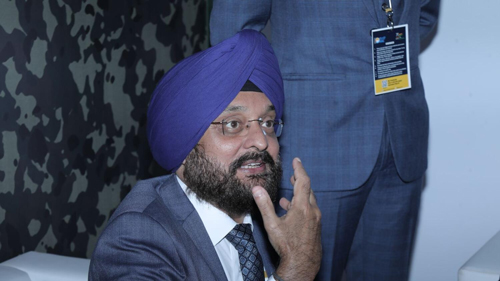
Amandeep Singh, president, International Operations of Ashok Leyland.
Ashok Leyland, the GCC’s only bus manufacturer, is beefing up investments at its Ras Al Khaimah plant as it scales up production and readies to tap the increasing potential of the UAE as a strategic springboard to export buses and trucks to Africa.
Buoyed by record bus sales that the Indian-origin brand notched up last year, the world’s fourth-largest bus maker is also doubling down on its intent to launch luxury coaches and electric buses in the GCC market.
“Last year had been a good year for us in the GCC overall and the UAE in particular. In FY 2022, we have more than doubled our sales in the region, obviously buoyed by the school bus and other orders, and we could increase our market share,” Amandeep Singh, president, International Operations of Ashok Leyland, told Khaleej Times.
Ashok Leyland, the flagship brand of the Hinduja Group, sold around 4,500 vehicles in the region in 2022, largely from its $50 million Ras Al Khaimah plant, while trucks were imported from India. The company has sold over 1,500 of its partner range of trucks in the region, and with increased plant capacity, the plan is afoot to manufacture trucks in the UAE plant.
“With line improvements and efficiency, we can now go up to a production of 5,500-6,000 units, and therefore we are on track to shift truck manufacturing to RAK,” Amandeep said.
In the staff and school bus segment, Ashok Leyland has over 70 per cent market share and 25-28 per cent in the overall vehicle market in the region.
Last year’s sales surge was also spurred by pent-up demand from the Covid years. The current year also looks promising and apart from demand for school buses, truck sales are also going up, Amandeep said, adding that Ashok Leyland is confident to generate better sales volumes in the UAE and neighboring countries, particularly in the growing Saudi Arabian market, and the expectation is to perform better than last year.
Luxury coaches, EVs
Singh said Ashok Leyland is in the process of developing coaches which will be contemporary in aesthetics and suitable for GCC markets. “This will be brought into the UAE market simultaneously with the UAE adopting the Euro 6 emission standards next year.”
Electric buses from Ashok Leyland’s subsidiary, Switch Mobility, are also expected to be on the UAE roads in a year’s time. Currently, EVs are produced both in India and the UK. “With Switch, we are in a sweet spot – in India, we are making vehicles for Indian specifications while in the UK, we make high-end versions. Markets like the UAE and GCC have requirements at both ends – staff buses and top-end city buses, Singh said.
“We will be able to meet the requirements at both ends, and I do not think there is any other company that can straddle both ends - either they are at the upper end or at the lower, but we are well placed straddling both,” he said.
In India, Ashok Leyland has 500 electric buses running and has an order book for another 2,000. “Depending upon how the market moves and customer demand, and the viability of these operations we will bring the EVs. It also depends on the various incentives the government will offer to make it viable,” Amandeep said.
Electric vehicles are going to play a large part in transportation in the coming days and Switch Mobility is evaluating al options including RAK. Ashok Leyland is also in talks with customers in the UAE for a trial run for EVs, which is critical particularly to test the batteries in harsh climactic conditions. On the demand side, customer demand and the market capacity to absorb the product in significant numbers is also important to make the production of EVs viable, he said.
Export finance, incentives
With enhanced capacity and new products in the pipeline, Ashok Leyland is looking at the UAE as a gateway to other markets, particularly Africa. “From the UAE base, we can scale up from ‘Made in the UAE’ to ‘Made for the World.’ For this, we need certain incentives–preference for local purchases and export finance so that we can develop the UAE as an export hub to Africa, which is evolving to be a large market for buses, particularly with virtually no public transport system in most of the countries. These incentives are also required to make us competitive in those markets,” Singh said.
“We are a majority player in the UAE market, and the focus is now on scaling up the export markets. “With EVs and coaches, we do need additional investments. We have been making investments over the years in the RAK plant to make production efficient, and we are ready to increase it further,” he said.
Courtesy: Khaleej Times
|
